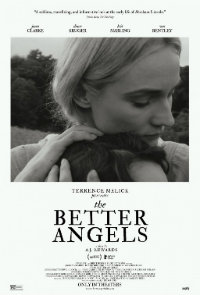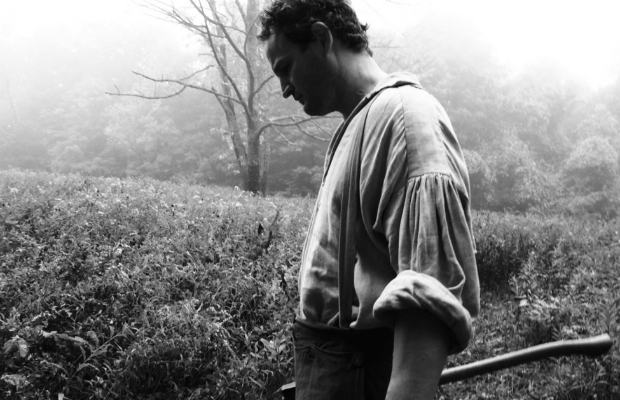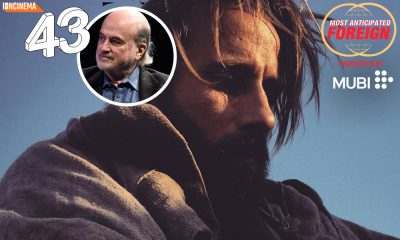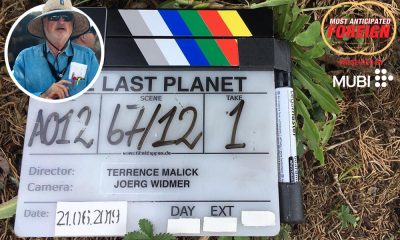Reviews
The Better Angels | Review
Edwards Breathes Malickian Verve Into Lincoln’s Youth
 It’s impossible to discuss director A.J. Edwards’ triumphant debut without first acknowledging his association with Terrence Malick. Having worked with the singular filmmaker for over a decade, from documenting the making of The New World, consulting on The Tree of Life and having edited To The Wonder, Edwards seems to have transformed from resolute disciple to artistic descendant, sponging both formal technique and spiritual inflection to create a film that looks, sounds and feels like the work of Malick, yet stands as something new, fresh and fully formed, if not stylistically original. In development since 2007 and still debuting in the wake of a handful of other recent Lincoln films, The Better Angels breathes refreshing verve into the little known story of Abraham Lincoln’s brief, but formative years spent in Indiana.
It’s impossible to discuss director A.J. Edwards’ triumphant debut without first acknowledging his association with Terrence Malick. Having worked with the singular filmmaker for over a decade, from documenting the making of The New World, consulting on The Tree of Life and having edited To The Wonder, Edwards seems to have transformed from resolute disciple to artistic descendant, sponging both formal technique and spiritual inflection to create a film that looks, sounds and feels like the work of Malick, yet stands as something new, fresh and fully formed, if not stylistically original. In development since 2007 and still debuting in the wake of a handful of other recent Lincoln films, The Better Angels breathes refreshing verve into the little known story of Abraham Lincoln’s brief, but formative years spent in Indiana.
Exhaustively researched, young Abe’s story is told with an artistic contradiction – with strict adherence to historical fact, yet obsessive attention to cinematic lyricism. Edwards says the poetry is written in the history itself, but he seems to expand its forgiving fictionalized borders ever so gently. Like the precise recreation of Jamestown in The New World, the backwoods Indiana of 1817 is actualized with remarkable authenticity, despite much of it actually being filmed in the Mohonk Preserve in the Appalachian Mountains.
The Lincolns live in an austere wooden cabin, weave fabric by loom, work wood by hand and land by ox. In this harsh reality, Edwards seeks to invoke an immersive experience that burrows down into the psyche with its vibrantly edited, lush steadicam footage and naturalistically detailed sound design. There is an overt feeling of physical impact – axes against timber, canes on skin, plows ripping the earth – that subtly resonates throughout the picture with the lasting cultural impact Lincoln has left on American society. It’s no coincidence then, that the film begins at the steps of the god like memorial that lies by the reflecting pool on the National Mall. Edwards knowingly humanizes the legend by showing his roots, his complex family dynamic, his austere upbringing and his uncommon interest in self education.
As with Malick’s films, the circumstances on screen are complemented by voiceovers which lyrically explicate while evoking an existential air. One of these voices is Lincoln’s cousin voiced in an authentic regional accent, his words factually lifted from an interview taken long ago, while the other seems to be the subconscious of Lincoln himself, reflecting on his childhood and relationships as if to suggest this small window of time may have changed the course of history.
With all its historical richness and pastoral imagery, its spiritual inclinations, natural performances and devotion to the complications inherent to kinship and education back in the time of Lincoln’s youth, The Better Angels is nothing if not an incredibly alive, wholly cohesive work that rides on the back of Malick’s prodigious approach to filmmaking, while sticking more firmly to narrative stringency than his mentor’s last few endeavors. The film is an astoundingly astute debut by a bright new talent whose aptitude for emulation will prompt some to claim unoriginality, but regardless if his voice sounds familiar or not, proof of profundity is found within.
★★★★½/☆☆☆☆☆
Reviewed on January 21st at the 2014 Sundance Film Festival – NEW FRONTIER Programme. 94 Min
































